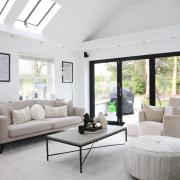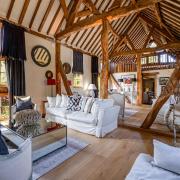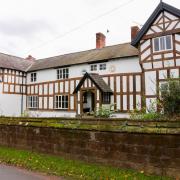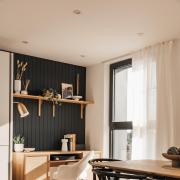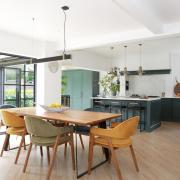Charlotte Cochrane of Made Below is keeping the faith that lockdown has made us all more aware of the importance of buying local and choosing sustainable

Working as a re-upholsterer, South Manchester-based Charlotte Cochrane, founder of Made Below, has had many conversations that have travelled similar paths: ‘My [insert well-known low-cost brand name here] sofa needs recovering, how much will it cost? Really? I could buy a new sofa for that!’
“The trouble is, that’s just what most people do and their old sofa goes to landfill and then a few years later they’re in the same boat,” Charlotte says. “I love it when people bring me really old furniture, that’s beautifully made and has already lasted decades. These pieces are often well-loved, family heirlooms that have been passed down from parents or grandparents and were made by true craftsmen. All that’s needed is a little TLC and giving new life with a contemporary fabric design and they’re ready for another few decades. Nobody ever passes Ikea furniture down the generations.”
Charlotte has been re-upholstering said family heirlooms for some time now, having come to it through a somewhat circuitous route.
“I left school at 15,” she tells me. “I joined the family business as a signwriter – when all signs were hand-drawn with paint and brushes. I did that for a few years but realised that I didn’t really want to spend my entire life in one place, so headed off to Israel for six months on a kibbutz. It’s safe to say that experience changed my life.”

Ironically, Charlotte’s time on a kibbutz didn’t do for her what it does for many of the residents. It didn’t free her up and give her the courage to step out of her comfort zone into a more creative lifestyle. Instead, she decided to get a job in an office.
“I took a job with the civil service...and swiftly realised that it really wasn’t for me. I really needed to get back to being creative and hands-on, but didn’t know what to do about that.”
Luckily, Charlotte found an outlet for her creative needs in the renovation of her new home. Life and children happened and it was a few years before she started to get really itchy about a career change.
“I took a break from work to look after my children and then pretty much thought ‘now what?’ I had been making soft furnishings – cushions and curtains and such – for our home and one day my husband handed me an envelope on which he had written ‘what’s inside may change your life.’ It was a £100 voucher for an upholstery course – and he was right, it did change my life.

“I went on the course and absolutely loved it. From then on all my free time was spent doing up old chairs and sofas and stools. I would scour junk shops, pull them out of skips... I started selling my pieces on eBay, then began getting commissions from friends and family and word started to spread. All this was done from the basement in our home – hence the name of my business, Made Below .”
Discover the Chester woman who has made door wreaths into a big thing.
Life was running along nicely for Charlotte, who was at last being both creative and hands-on practical, but an idea was bobbing about at the back of her mind that eventually she just had to act on.
“I’d been mulling around the whole ‘disposable furniture’ thing in my head for some time, feeling frustrated that properly made-to-last British furniture just didn’t seem important to people. I had seen a lot of furniture come through my doors and not all of it was good quality or had any degree of individuality. I really wanted to turn that around, be part of the movement that is all about convincing people that its worth investing in good stuff and keeping it.

“Last year I went to a networking event and met the man behind Defiance Gin, which uses mostly locally foraged botanicals to give it a hyperlocal flavour. It struck me that maybe I could do something similar with furniture, so I set about figuring it out.”
Charlotte found two mills in Yorkshire that have been working continuously for over 300 years, weaving and dying upholstery-quality wool, and fell in love with their product.
“I think they’re only two mills left in England doing this, at least the only two that have never stopped working since they were opened. They are able to match any fabric colour you want. I love the richness and depth of tone they can achieve. Wool is lovely to work with and it’s sustainable too – and this wool can be tracked back to the very farm it came from, so we know that the animal welfare is top quality too.
“I then set about creating my first designs, deciding to go with benches, ottomans, footstools and bay window seats as they are practical but should be beautiful too. A lot of the hallway benches I have seen are really basic, and there’s no reason why you shouldn’t have a fabulous pop of colour in a space that is otherwise usually quite ignored. My first collection uses solid colours, but I will expand this with beautiful patterned fabrics soon. All the other materials are sourced very locally, including the wood, which is of course sustainably sourced. I wanted to find someone who could supply me with hand-turned legs, rather than buy factory-made legs and I was introduced to Phil Aitken, who not only is a trained cabinet-maker but also trained in re-upholstery. He helped me solve a design issue I had been struggling with and I decided not to let him go, so he’s now my frame maker too.”
This whole process took around 12 months, and Charlotte was ready to launch in late March – and we all know what happened in late March.
“I had planned a launch event, which of course couldn’t happen. But lockdown at least made people focus on their homes, so there’s been a lot of interest online so far. I joined the Make It British online directory which has been really good too. It just goes to show that people do indeed want to know where the products they buy are made, and who they are made by – and want to buy British.”
Follow Cheshire Life on Facebook for more inspiring stories





